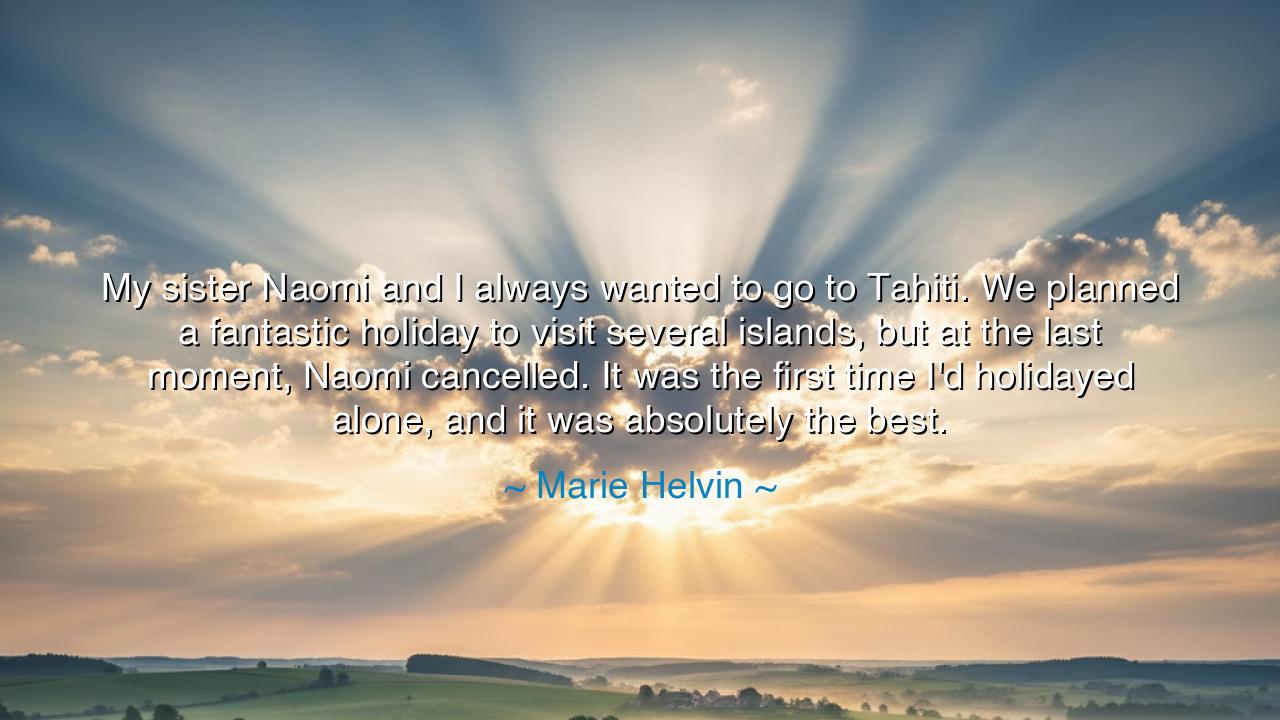
My sister Naomi and I always wanted to go to Tahiti. We planned a
My sister Naomi and I always wanted to go to Tahiti. We planned a fantastic holiday to visit several islands, but at the last moment, Naomi cancelled. It was the first time I'd holidayed alone, and it was absolutely the best.






The words of Marie Helvin — “My sister Naomi and I always wanted to go to Tahiti. We planned a fantastic holiday to visit several islands, but at the last moment, Naomi cancelled. It was the first time I’d holidayed alone, and it was absolutely the best.” — shimmer with quiet revelation. Though spoken lightly, they hold a profound truth about solitude, self-discovery, and freedom. In this simple memory of a journey once planned and altered, Helvin unveils the timeless lesson that the greatest adventures often begin when we are alone — when life’s unexpected turns lead us not away from joy, but toward the hidden depths of our own spirit.
At its heart, this quote is about transformation through solitude. Helvin, a model and traveler, describes not merely a trip, but a spiritual awakening — a moment when the world opened to her in a new way because she faced it without the familiar companionship of another. The plan was for two; fate decreed one. In that twist of fortune, she discovered something ancient and powerful: that solitude, though daunting, can be liberating. To travel alone is to meet oneself anew — to see not only the world, but also the soul reflected in it. The sky, the sea, the mountains, and the faces of strangers speak differently when there is no one else between them and your gaze.
The origin of this truth is as old as humanity itself. Since the dawn of civilization, every seeker, poet, and pilgrim has walked the path of solitude to find wisdom. The sages of old would leave their cities and wander the wilderness; the mystics would retreat to mountains or deserts to hear the voice within. In Marie Helvin’s story, the modern journey replaces the ancient pilgrimage — her Tahiti becomes her temple, her holiday her revelation. Alone among the islands, she found what generations of wanderers have found before her: that solitude is not emptiness, but encounter — the meeting of the self with its truest essence.
To walk alone, especially for the first time, is to step beyond the walls of dependency. It can be scary, as Helvin herself admits indirectly, for we have been taught to measure happiness by company. But solitude, when embraced, transforms fear into freedom. The quiet becomes a teacher. The traveler who journeys alone learns to trust her instincts, to listen deeply, to find strength in her own presence. In this way, she discovers that she is not, and has never been, truly alone — that the universe itself keeps company with the soul that dares to wander freely.
Consider the story of Amelia Earhart, the aviator who crossed oceans alone. Like Helvin, she knew the thrill of stepping into the unknown, unsupported but unafraid. The sky was her Tahiti, the clouds her islands. Her solitude was not loneliness, but liberation — proof that a woman could define her destiny by courage rather than convention. Though her life ended in mystery, her legacy endures as a symbol of self-reliance and fearless discovery. Both Helvin and Earhart, in their own ways, teach that to journey alone is not to abandon the world, but to meet it without filters — to feel it more vividly, to live it more truthfully.
Helvin’s joy at finding her solo journey “absolutely the best” speaks to a transformation many resist. What began as an accident — a cancellation, a disappointment — became a gift. Life often works in this way: what seems like loss hides a doorway to growth. The absence of her sister, the breaking of plans, forced her to step into the unfamiliar and to realize her own independence. Solitude revealed her strength, and strength revealed her joy. It is a lesson that every soul must learn — that sometimes, the plans that fall apart are the ones that set us free.
The lesson, then, is this: embrace solitude as a sacred journey. When the path diverges and companions fall away, do not curse fate — follow it. Learn to travel through life not always with others, but with yourself. Go to the “Tahiti” of your own longing — the dream or goal you once postponed for fear of being alone. Let the stillness of solitude teach you to see, to feel, to breathe without needing permission. For in the end, the world belongs to those who dare to face it unaccompanied, who find peace in their own company and beauty in their own reflection.
So, O traveler of the heart, remember Marie Helvin’s quiet wisdom: being alone is not a void — it is an awakening. The journey you take alone will not diminish you; it will complete you. For in solitude, you will find not absence, but presence — not fear, but freedom. And when you return from that journey, you will know that the truest companionship in life begins with the friendship you hold with your own soul.






AAdministratorAdministrator
Welcome, honored guests. Please leave a comment, we will respond soon